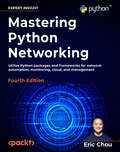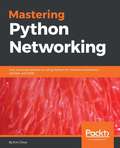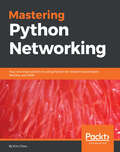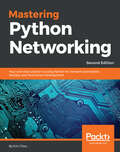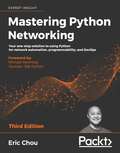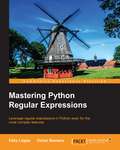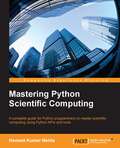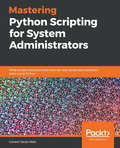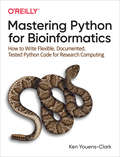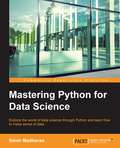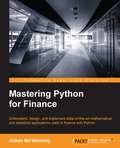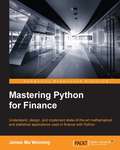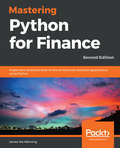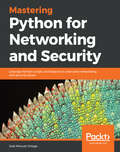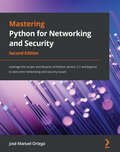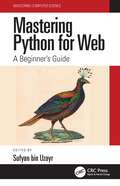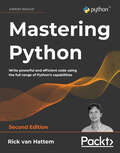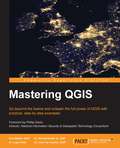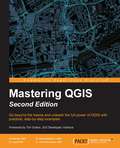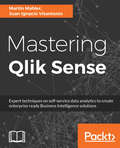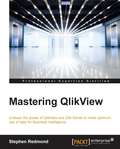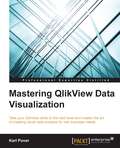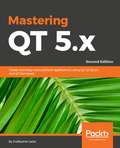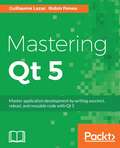- Table View
- List View
Mastering Python Networking: Utilize Python packages and frameworks for network automation, monitoring, cloud, and management
by Eric ChouGet to grips with the latest container examples, Python 3 features, GitLab DevOps, network data analysis, and cloud networking to get the most out of Python for network engineering with the latest edition of this bestselling guide Purchase of the print or Kindle book includes a free eBook in PDF format.Key FeaturesLeverage Python's powerful libraries and frameworks to build production-ready network automation solutions efficiently and effectivelyImplement network security, monitoring, and management solutions using modern DevOps tools and cloud-native approachesUtilize AsyncIO and cloud capabilities in Python 3 for AWS and Azure network solutionsBook DescriptionNetworks in your infrastructure set the foundation for deploying, maintaining, and servicing applications. Python is the ideal language for network engineers to explore tools that were previously available to systems engineers and application developers. Mastering Python Networking, Fourth edition, guides you on a Python-driven journey from traditional network engineering to modern network development. This new edition incorporates the latest Python features and DevOps frameworks. In addition to new chapters on introducing Docker containers and Python 3 Async IO for network engineers, each chapter is updated with the latest libraries and working examples to ensure compatibility and clarity of the concepts. Starting with a basic overview of Python, the book teaches you how it can interact with both legacy and API-enabled network devices. You will learn to leverage high-level Python packages and frameworks to perform network automation tasks, monitoring, management, and enhanced network security, followed by AWS and Azure cloud networking. You will use Git for code management, GitLab for continuous integration, and Python-based testing tools to verify your network. By the end of this book, you'll be a confident network developer capable of automating modern infrastructure using Python, DevOps practices, and cloud technologies.What you will learnUse Python to interact with network devicesExplore Docker for efficient network application development and deploymentExtract network insights using Python and monitoring tools like NetFlow and SNMPAnalyze network data with ELK for real-time visualization Build high-level API with Flask for in-house applicationsDiscover the new AsyncIO feature and its concepts in Python 3Explore test-driven development concepts and use PyTest to drive code test coverageUnderstand how to implement DevOps best practices with GitLab in networkingWho this book is forMastering Python Networking, Fourth edition is for network engineers, developers, and SREs who want to learn Python for network automation, programmability, monitoring, cloud, and data analysis. Network engineers who want to transition from manual to automation-based networks using the latest DevOps tools will also get a lot of useful information from this book. Basic familiarity with Python programming and networking-related concepts such as Transmission Control Protocol/Internet Protocol (TCP/IP) will be helpful in getting the most out of this book.
Mastering Python Networking: Utilize Python packages and frameworks for network automation, monitoring, cloud, and management, 4th Edition
by Eric ChouGet to grips with the latest container examples, Python 3 features, GitLab DevOps, network data analysis, and cloud networking to get the most out of Python for network engineering with the latest edition of this bestselling guidePurchase of the print or Kindle book includes a free eBook in PDF format.Key FeaturesExplore the power of the latest Python libraries and frameworks to tackle common and complex network problems efficiently and effectivelyUse Python and other open source tools for Network DevOps, automation, management, and monitoringUse Python 3 to implement advanced network-related featuresBook DescriptionNetworks in your infrastructure set the foundation for how your application can be deployed, maintained, and serviced. Python is the ideal language for network engineers to explore tools that were previously available to systems engineers and application developers. In Mastering Python Networking, Fourth edition, you'll embark on a Python-based journey to transition from a traditional network engineer to a network developer ready for the next generation of networks.This new edition is completely revised and updated to work with the latest Python features and DevOps frameworks. In addition to new chapters on introducing Docker containers and Python 3 Async IO for network engineers, each chapter is updated with the latest libraries with working examples to ensure compatibility and understanding of the concepts.Starting with a basic overview of Python, the book teaches you how it can interact with both legacy and API-enabled network devices. You will learn to leverage high-level Python packages and frameworks to perform network automation tasks, monitoring, management, and enhanced network security, followed by AWS and Azure cloud networking. You will use Git for code management, GitLab for continuous integration, and Python-based testing tools to verify your network.What you will learnUse Python to interact with network devicesUnderstand Docker as a tool that you can use for the development and deploymentUse Python and various other tools to obtain information from the networkLearn how to use ELK for network data analysisUtilize Flask and construct high-level API to interact with in-house applicationsDiscover the new AsyncIO feature and its concepts in Python 3Explore test-driven development concepts and use PyTest to drive code test coverageUnderstand how GitLab can be used with DevOps practices in networkingWho this book is forMastering Python Networking, Fourth edition is for network engineers, developers, and SREs who want to learn Python for network automation, programmability, monitoring, cloud, and data analysis. Network engineers who want to transition from manual to automation-based networks using the latest DevOps tools will also get a lot of useful information from this book.Basic familiarity with Python programming and networking-related concepts such as Transmission Control Protocol/Internet Protocol (TCP/IP) will be helpful in getting the most out of this book.
Mastering Python Networking: Your One-stop Solution To Using Python For Network Automation, Devops, And Test-driven Development, 2nd Edition
by Eric ChouPython is also an extension language for applications written in other languages that need easy-to-use scripting or automation interfaces. It is one of the easiest languages with which you can perform network automation. This book will cover all advanced networking concepts using Python.
Mastering Python Networking: Your one stop solution to using Python for network automation, DevOps, and SDN
by Eric ChouBecome an expert in implementing advanced, network-related tasks with Python.Key FeaturesBuild the skills to perform all networking tasks using Python with easeUse Python for network device automation, DevOps, and software-defined networkingGet practical guidance to networking with PythonBook DescriptionThis book begins with a review of the TCP/ IP protocol suite and a refresher of the core elements of the Python language. Next, you will start using Python and supported libraries to automate network tasks from the current major network vendors. We will look at automating traditional network devices based on the command-line interface, as well as newer devices with API support, with hands-on labs. We will then learn the concepts and practical use cases of the Ansible framework in order to achieve your network goals.We will then move on to using Python for DevOps, starting with using open source tools to test, secure, and analyze your network. Then, we will focus on network monitoring and visualization. We will learn how to retrieve network information using a polling mechanism, ?ow-based monitoring, and visualizing the data programmatically. Next, we will learn how to use the Python framework to build your own customized network web services.In the last module, you will use Python for SDN, where you will use a Python-based controller with OpenFlow in a hands-on lab to learn its concepts and applications. We will compare and contrast OpenFlow, OpenStack, OpenDaylight, and NFV. Finally, you will use everything you've learned in the book to construct a migration plan to go from a legacy to a scalable SDN-based network.What you will learnReview all the fundamentals of Python and the TCP/IP suiteUse Python to execute commands when the device does not support the API or programmatic interaction with the deviceImplement automation techniques by integrating Python with Cisco, Juniper, and Arista eAPIIntegrate Ansible using Python to control Cisco, Juniper, and Arista networksAchieve network security with PythonBuild Flask-based web-service APIs with PythonConstruct a Python-based migration plan from a legacy to scalable SDN-based networkWho this book is forIf you are a network engineer or a programmer who wants to use Python for networking, then this book is for you. A basic familiarity with networking-related concepts such as TCP/IP and a familiarity with Python programming will be useful.
Mastering Python Networking: Your one-stop solution to using Python for network automation, DevOps, and Test-Driven Development, 2nd Edition
by Eric ChouPublisher's Note: This edition from 2018 is outdated. A new third edition, updated for 2020 featuring Python 3.8, with coverage extended to include Azure, AWS, and Ansible 2.8, and data analysis using Elastic Stack has just been published.Master the art of using Python for a diverse range of network engineering tasks.Key FeaturesExplore the power of Python libraries to tackle difficult network problems efficiently and effectivelyUse Python for network device automation, DevOps, and software-defined networkingBecome an expert in implementing advanced network-related tasks with PythonBook DescriptionNetworks in your infrastructure set the foundation for how your application can be deployed, maintained, and serviced. Python is the ideal language for network engineers to explore tools that were previously available to systems engineers and application developers. In this second edition of Mastering Python Networking, you'll embark on a Python-based journey to transition from traditional network engineers to network developers ready for the next-generation of networks. This book begins by reviewing the basics of Python and teaches you how Python can interact with both legacy and API-enabled network devices. As you make your way through the chapters, you will then learn to leverage high-level Python packages and frameworks to perform network engineering tasks for automation, monitoring, management, and enhanced security. In the concluding chapters, you will use Jenkins for continuous network integration as well as testing tools to verify your network. By the end of this book, you will be able to perform all networking tasks with ease using Python.What you will learnUse Python libraries to interact with your networkIntegrate Ansible 2.5 using Python to control Cisco, Juniper, and Arista eAPI network devicesLeverage existing frameworks to construct high-level APIs Learn how to build virtual networks in the AWS Cloud Understand how Jenkins can be used to automatically deploy changes in your networkUse PyTest and Unittest for Test-Driven Network DevelopmentWho this book is forMastering Python Networking is for network engineers and programmers who want to use Python for networking. Basic familiarity with Python programming and networking-related concepts such as Transmission Control Protocol/Internet Protocol (TCP/IP) will be useful.
Mastering Python Networking: Your one-stop solution to using Python for network automation, programmability, and DevOps, 3rd Edition
by Michael Kennedy Eric Chou Mandy WhaleyNew edition of the bestselling guide to mastering Python Networking, updated to Python 3 and including the latest on network data analysis, Cloud Networking, Ansible 2.8, and new libraries Key Features Explore the power of Python libraries to tackle difficult network problems efficiently and effectively, including pyATS, Nornir, and Ansible 2.8 Use Python and Ansible for DevOps, network device automation, DevOps, and software-defined networking Become an expert in implementing advanced network-related tasks with Python 3 Book Description Networks in your infrastructure set the foundation for how your application can be deployed, maintained, and serviced. Python is the ideal language for network engineers to explore tools that were previously available to systems engineers and application developers. In Mastering Python Networking, Third edition, you'll embark on a Python-based journey to transition from traditional network engineers to network developers ready for the next-generation of networks. This new edition is completely revised and updated to work with Python 3. In addition to new chapters on network data analysis with ELK stack (Elasticsearch, Logstash, Kibana, and Beats) and Azure Cloud Networking, it includes updates on using newer libraries such as pyATS and Nornir, as well as Ansible 2.8. Each chapter is updated with the latest libraries with working examples to ensure compatibility and understanding of the concepts. Starting with a basic overview of Python, the book teaches you how it can interact with both legacy and API-enabled network devices. You will learn to leverage high-level Python packages and frameworks to perform network automation tasks, monitoring, management, and enhanced network security followed by Azure and AWS Cloud networking. Finally, you will use Jenkins for continuous integration as well as testing tools to verify your network. What you will learn Use Python libraries to interact with your network Integrate Ansible 2.8 using Python to control Cisco, Juniper, and Arista network devices Leverage existing Flask web frameworks to construct high-level APIs Learn how to build virtual networks in the AWS & Azure Cloud Learn how to use Elastic Stack for network data analysis Understand how Jenkins can be used to automatically deploy changes in your network Use PyTest and Unittest for Test-Driven Network Development in networking engineering with Python Who this book is for Mastering Python Networking, Third edition is for network engineers, developers, and SREs who want to use Python for network automation, programmability, and data analysis. Basic familiarity with Python programming and networking-related concepts such as Transmission Control Protocol/Internet Protocol (TCP/IP) will be useful.
Mastering Python Regular Expressions
by Víctor Romero Félix LópezA short and straight to the point guide that explains the implementation of Regular Expressions in Python. This book is aimed at Python developers who want to learn how to leverage Regular Expressions in Python. Basic knowledge of Python is required for a better understanding.
Mastering Python Scientific Computing
by Hemant Kumar MehtaA complete guide for Python programmers to master scientific computing using Python APIs and tools About This Book * The basics of scientific computing to advanced concepts involving parallel and large scale computation are all covered. * Most of the Python APIs and tools used in scientific computing are discussed in detail * The concepts are discussed with suitable example programs Who This Book Is For If you are a Python programmer and want to get your hands on scientific computing, this book is for you. The book expects you to have had exposure to various concepts of Python programming. What You Will Learn * Fundamentals and components of scientific computing * Scientific computing data management * Performing numerical computing using NumPy and SciPy * Concepts and programming for symbolic computing using SymPy * Using the plotting library matplotlib for data visualization * Data analysis and visualization using Pandas, matplotlib, and IPython * Performing parallel and high performance computing * Real-life case studies and best practices of scientific computing In Detail In today's world, along with theoretical and experimental work, scientific computing has become an important part of scientific disciplines. Numerical calculations, simulations and computer modeling in this day and age form the vast majority of both experimental and theoretical papers. In the scientific method, replication and reproducibility are two important contributing factors. A complete and concrete scientific result should be reproducible and replicable. Python is suitable for scientific computing. A large community of users, plenty of help and documentation, a large collection of scientific libraries and environments, great performance, and good support makes Python a great choice for scientific computing. At present Python is among the top choices for developing scientific workflow and the book targets existing Python developers to master this domain using Python. The main things to learn in the book are the concept of scientific workflow, managing scientific workflow data and performing computation on this data using Python. The book discusses NumPy, SciPy, SymPy, matplotlib, Pandas and IPython with several example programs. Style and approach This book follows a hands-on approach to explain the complex concepts related to scientific computing. It details various APIs using appropriate examples.
Mastering Python Scripting for System Administrators: Write scripts and automate them for real-world administration tasks using Python
by Ganesh NaikThis book would be ideal for users with some basic understanding of Python programming and who are interested in scaling their programming skills to command line scripting and system administration. Prior knowledge of Python would be necessary.
Mastering Python for Bioinformatics: How To Write Flexible, Documented, Tested Python Code For Research Computing
by Ken Youens-ClarkLife scientists today urgently need training in bioinformatics skills. Too many bioinformatics programs are poorly written and barely maintained, usually by students and researchers who've never learned basic programming skills. This practical guide shows postdoc bioinformatics professionals and students how to exploit the best parts of Python to solve problems in biology while creating documented, tested, reproducible software.Ken Youens-Clark, author of Tiny Python Projects (Manning), demonstrates not only how to write effective Python code but also how to use tests to write and refactor scientific programs. You'll learn the latest Python features and tools including linters, formatters, type checkers, and tests to create documented and tested programs. You'll also tackle 14 challenges in Rosalind, a problem-solving platform for learning bioinformatics and programming.Create command-line Python programs to document and validate parametersWrite tests to verify refactor programs and confirm they're correctAddress bioinformatics ideas using Python data structures and modules such as BiopythonCreate reproducible shortcuts and workflows using makefilesParse essential bioinformatics file formats such as FASTA and FASTQFind patterns of text using regular expressionsUse higher-order functions in Python like filter(), map(), and reduce()
Mastering Python for Data Science
by Samir MadhavanExplore the world of data science through Python and learn how to make sense of data About This Book * Master data science methods using Python and its libraries * Create data visualizations and mine for patterns * Advanced techniques for the four fundamentals of Data Science with Python - data mining, data analysis, data visualization, and machine learning Who This Book Is For If you are a Python developer who wants to master the world of data science then this book is for you. Some knowledge of data science is assumed. What You Will Learn * Manage data and perform linear algebra in Python * Derive inferences from the analysis by performing inferential statistics * Solve data science problems in Python * Create high-end visualizations using Python * Evaluate and apply the linear regression technique to estimate the relationships among variables. * Build recommendation engines with the various collaborative filtering algorithms * Apply the ensemble methods to improve your predictions * Work with big data technologies to handle data at scale In Detail Data science is a relatively new knowledge domain which is used by various organizations to make data driven decisions. Data scientists have to wear various hats to work with data and to derive value from it. The Python programming language, beyond having conquered the scientific community in the last decade, is now an indispensable tool for the data science practitioner and a must-know tool for every aspiring data scientist. Using Python will offer you a fast, reliable, cross-platform, and mature environment for data analysis, machine learning, and algorithmic problem solving. This comprehensive guide helps you move beyond the hype and transcend the theory by providing you with a hands-on, advanced study of data science. Beginning with the essentials of Python in data science, you will learn to manage data and perform linear algebra in Python. You will move on to deriving inferences from the analysis by performing inferential statistics, and mining data to reveal hidden patterns and trends. You will use the matplot library to create high-end visualizations in Python and uncover the fundamentals of machine learning. Next, you will apply the linear regression technique and also learn to apply the logistic regression technique to your applications, before creating recommendation engines with various collaborative filtering algorithms and improving your predictions by applying the ensemble methods. Finally, you will perform K-means clustering, along with an analysis of unstructured data with different text mining techniques and leveraging the power of Python in big data analytics. Style and approach This book is an easy-to-follow, comprehensive guide on data science using Python. The topics covered in the book can all be used in real world scenarios.
Mastering Python for Finance
by James Ma WeimingIf you are an undergraduate or graduate student, a beginner to algorithmic development and research, or a software developer in the financial industry who is interested in using Python for quantitative methods in finance, this is the book for you. It would be helpful to have a bit of familiarity with basic Python usage, but no prior experience is required.
Mastering Python for Finance
by James Ma Weiming<P><P>Understand, design, and implement state-of-the-art mathematical and statistical applications used in finance with Python <P><P>About This Book <P><P>Explore financial models used by the industry and ways of solving them with this guide <P><P>Discover the various features that Python provides for scientific computing and harness them to enhance your financial applications <P><P>Build state-of-the-art infrastructure for critical aspects such as modeling, trading, pricing, and analytics <P><P>Who This Book Is For <P><P>If you are an undergraduate or graduate student, a beginner to algorithmic development and research, or a software developer in the financial industry who is interested in using Python for quantitative methods in finance, this is the book for you. It would be helpful to have a bit of familiarity with basic Python usage, but no prior experience is required. <P><P>What You Will Learn <P><P>Perform interactive computing with IPython Notebook <P><P>Solve linear equations of financial models and perform ordinary least squares regression <P><P>Explore nonlinear modeling and solutions for optimum points using root-finding algorithms and solvers <P><P>Discover different types of numerical procedures used in pricing options <P><P>Model fixed-income instruments with bonds and interest rates <P><P>Manage big data with NoSQL and perform analytics with Hadoop <P><P>Build a high-frequency algorithmic trading platform with Python <P><P>Create an event-driven backtesting tool and measure your strategies <P><P>In Detail <P><P>Built initially for scientific computing, Python quickly found its place in finance. Its flexibility and robustness can be easily incorporated into applications for mathematical studies, research, and software development. <P><P>With this book, you will learn about all the tools you need to successfully perform research studies and modeling, improve your trading strategies, and effectively manage risks. You will explore the various tools and techniques used in solving complex problems commonly faced in finance. <P><P>You will learn how to price financial instruments such as stocks, options, interest rate derivatives, and futures using computational methods. Also, you will learn how you can perform data analytics on market indexes and use NoSQL to store tick data.
Mastering Python for Finance: Implement advanced state-of-the-art financial statistical applications using Python, 2nd Edition
by James Ma WeimingTake your financial skills to the next level by mastering cutting-edge mathematical and statistical financial applicationsKey FeaturesExplore advanced financial models used by the industry and ways of solving them using PythonBuild state-of-the-art infrastructure for modeling, visualization, trading, and moreEmpower your financial applications by applying machine learning and deep learningBook DescriptionThe second edition of Mastering Python for Finance will guide you through carrying out complex financial calculations practiced in the industry of finance by using next-generation methodologies. You will master the Python ecosystem by leveraging publicly available tools to successfully perform research studies and modeling, and learn to manage risks with the help of advanced examples.You will start by setting up your Jupyter notebook to implement the tasks throughout the book. You will learn to make efficient and powerful data-driven financial decisions using popular libraries such as TensorFlow, Keras, Numpy, SciPy, and sklearn. You will also learn how to build financial applications by mastering concepts such as stocks, options, interest rates and their derivatives, and risk analytics using computational methods. With these foundations, you will learn to apply statistical analysis to time series data, and understand how time series data is useful for implementing an event-driven backtesting system and for working with high-frequency data in building an algorithmic trading platform. Finally, you will explore machine learning and deep learning techniques that are applied in finance.By the end of this book, you will be able to apply Python to different paradigms in the financial industry and perform efficient data analysis.What you will learnSolve linear and nonlinear models representing various financial problemsPerform principal component analysis on the DOW index and its componentsAnalyze, predict, and forecast stationary and non-stationary time series processesCreate an event-driven backtesting tool and measure your strategiesBuild a high-frequency algorithmic trading platform with PythonReplicate the CBOT VIX index with SPX options for studying VIX-based strategiesPerform regression-based and classification-based machine learning tasks for predictionUse TensorFlow and Keras in deep learning neural network architectureWho this book is forIf you are a financial or data analyst or a software developer in the financial industry who is interested in using advanced Python techniques for quantitative methods in finance, this is the book you need! You will also find this book useful if you want to extend the functionalities of your existing financial applications by using smart machine learning techniques. Prior experience in Python is required.
Mastering Python for Networking and Security: Leverage Python scripts and libraries to overcome networking and security issues
by Jose Manuel OrtegaMaster Python scripting to build a network and perform security operationsKey FeaturesLearn to handle cyber attacks with modern Python scriptingDiscover various Python libraries for building and securing your networkUnderstand Python packages and libraries to secure your network infrastructureBook DescriptionIt's becoming more and more apparent that security is a critical aspect of IT infrastructure. A data breach is a major security incident, usually carried out by just hacking a simple network line. Increasing your network's security helps step up your defenses against cyber attacks. Meanwhile, Python is being used for increasingly advanced tasks, with the latest update introducing many new packages. This book focuses on leveraging these updated packages to build a secure network with the help of Python scripting. This book covers topics from building a network to the different procedures you need to follow to secure it. You'll first be introduced to different packages and libraries, before moving on to different ways to build a network with the help of Python scripting. Later, you will learn how to check a network's vulnerability using Python security scripting, and understand how to check vulnerabilities in your network. As you progress through the chapters, you will also learn how to achieve endpoint protection by leveraging Python packages along with writing forensic scripts. By the end of this book, you will be able to get the most out of the Python language to build secure and robust networks that are resilient to attacks.What you will learnDevelop Python scripts for automating security and pentesting tasksDiscover the Python standard library's main modules used for performing security-related tasksAutomate analytical tasks and the extraction of information from serversExplore processes for detecting and exploiting vulnerabilities in serversUse network software for Python programmingPerform server scripting and port scanning with PythonIdentify vulnerabilities in web applications with PythonUse Python to extract metadata and forensicsWho this book is forThis book is ideal for network engineers, system administrators, or any security professional looking at tackling networking and security challenges. Programmers with some prior experience in Python will get the most out of this book. Some basic understanding of general programming structures and Python is required.
Mastering Python for Networking and Security: Leverage the scripts and libraries of Python version 3.7 and beyond to overcome networking and security issues, 2nd Edition
by Jose Manuel OrtegaTackle security and networking issues using Python libraries such as Nmap, requests, asyncio, and scapyKey FeaturesEnhance your Python programming skills in securing systems and executing networking tasksExplore Python scripts to debug and secure complex networksLearn to avoid common cyber events with modern Python scriptingBook DescriptionIt's now more apparent than ever that security is a critical aspect of IT infrastructure, and that devastating data breaches can occur from simple network line hacks. As shown in this book, combining the latest version of Python with an increased focus on network security can help you to level up your defenses against cyber attacks and cyber threats. Python is being used for increasingly advanced tasks, with the latest update introducing new libraries and packages featured in the Python 3.7.4 recommended version. Moreover, most scripts are compatible with the latest versions of Python and can also be executed in a virtual environment. This book will guide you through using these updated packages to build a secure network with the help of Python scripting. You'll cover a range of topics, from building a network to the procedures you need to follow to secure it. Starting by exploring different packages and libraries, you'll learn about various ways to build a network and connect with the Tor network through Python scripting. You will also learn how to assess a network's vulnerabilities using Python security scripting. Later, you'll learn how to achieve endpoint protection by leveraging Python packages, along with writing forensic scripts. By the end of this Python book, you'll be able to use Python to build secure apps using cryptography and steganography techniques.What you will learnCreate scripts in Python to automate security and pentesting tasksExplore Python programming tools that are used in network security processesAutomate tasks such as analyzing and extracting information from serversUnderstand how to detect server vulnerabilities and analyze security modulesDiscover ways to connect to and get information from the Tor networkFocus on how to extract information with Python forensics toolsWho this book is forThis Python network security book is for network engineers, system administrators, or any security professional looking to overcome networking and security challenges. You will also find this book useful if you're a programmer with prior experience in Python. A basic understanding of general programming structures and the Python programming language is required before getting started.
Mastering Python for Web: A Beginner's Guide (Mastering Computer Science)
by Sufyan Bin UzayrPython for Web Python definitely tops the charts when it comes to ease of use and beginner-friendly learning curve in the world of programming languages. At the same time, Python is essential when it comes to writing system scripts, processing big data, performing mathematical computations, creating web applications, and rapid prototyping. With this Mastering edition, we have focused especially on the usage of Python for Web. This book explores Python programming fundamentals with interactive projects and introduces core coding concepts and the basics of Python-based web development. The reader should be ready to dive deep into the world of Python for web development in no time. Since Python positions itself in web development as a back-end language, it is usually mixed with another front-end language to build a whole website. At the same time, reasons for using Python in web development are many: it is a flexible, versatile, and highly efficient programming language with dynamic typing capacity. This book helps readers to examine Python’s key back-end/front-end programming techniques and guides them through implementing them when creating professional projects. Furthermore, it also focuses on teaching readers how to solve common problems and developing web services with Python frameworks such as Django and Flask. Mastering Python for Web has a goal more ambitious than simply teaching you the ropes – it aims to help you embrace and master problem solving, which could be viewed as the single most crucial skill for a coder. It offers you a focal point on starting as a beginner and growing into an expert by putting your newly acquired knowledge into practice. Programming is a hands-on skill, and this particular book helps you put your skills to test with easy-to-grasp tasks and examples. Learn more about our other Mastering titles at: https://www.routledge.com/Mastering-Computer-Science/book-series/MCS
Mastering Python: Write powerful and efficient code using the full range of Python's capabilities, 2nd Edition
by Rick van HattemUse advanced features of Python to write high-quality, readable code and packagesKey FeaturesExtensively updated for Python 3.10 with new chapters on design patterns, scientific programming, machine learning, and interactive PythonShape your scripts using key concepts like concurrency, performance optimization, asyncio, and multiprocessingLearn how advanced Python features fit together to produce maintainable codeBook DescriptionEven if you find writing Python code easy, writing code that is efficient, maintainable, and reusable is not so straightforward. Many of Python's capabilities are underutilized even by more experienced programmers. Mastering Python, Second Edition, is an authoritative guide to understanding advanced Python programming so you can write the highest quality code. This new edition has been extensively revised and updated with exercises, four new chapters and updates up to Python 3.10.Revisit important basics, including Pythonic style and syntax and functional programming. Avoid common mistakes made by programmers of all experience levels. Make smart decisions about the best testing and debugging tools to use, optimize your code's performance across multiple machines and Python versions, and deploy often-forgotten Python features to your advantage. Get fully up to speed with asyncio and stretch the language even further by accessing C functions with simple Python calls. Finally, turn your new-and-improved code into packages and share them with the wider Python community.If you are a Python programmer wanting to improve your code quality and readability, this Python book will make you confident in writing high-quality scripts and taking on bigger challengesWhat you will learnWrite beautiful Pythonic code and avoid common Python coding mistakesApply the power of decorators, generators, coroutines, and metaclassesUse different testing systems like pytest, unittest, and doctestTrack and optimize application performance for both memory and CPU usageDebug your applications with PDB, Werkzeug, and faulthandlerImprove your performance through asyncio, multiprocessing, and distributed computingExplore popular libraries like Dask, NumPy, SciPy, pandas, TensorFlow, and scikit-learnExtend Python's capabilities with C/C++ libraries and system callsWho this book is forThis book will benefit more experienced Python programmers who wish to upskill, serving as a reference for best practices and some of the more intricate Python techniques. Even if you have been using Python for years, chances are that you haven't yet encountered every topic discussed in this book. A good understanding of Python programming is necessary
Mastering QGIS
by Richard Smith Kurt Menke GispIf you are a GIS professional, a consultant, a student, or perhaps a fast learner who wants to go beyond the basics of QGIS, then this book is for you. It will prepare you to realize the full potential of QGIS.
Mastering QGIS - Second Edition
by Dr Richard Gisp Dr Luigi Pirelli Gisp Kurt Menke Dr John GispGo beyond the basics and unleash the full power of QGIS with practical, step-by-step examples About This Book * This book is your one-stop solution to all of your GIS needs using the open source QGIS * Master QGIS by learning about database integration, geoprocessing tools, Python scripts, advanced cartography, and custom plugins * This example-rich, practical guide will help you create sophisticated analyses and maps Who This Book Is For If you are a GIS professional, a consultant, a student, or perhaps a fast learner who wants to go beyond the basics of QGIS, then this book is for you. It will prepare you to realize the full potential of QGIS. What You Will Learn * Create and manage a spatial database * Get to know advanced techniques to style GIS data * Prepare both vector and raster data for processing * Add heat maps, live layer effects, and labels to your maps * Master LAStools and GRASS integration with the Processing Toolbox * Edit and repair topological data errors * Automate workflows with batch processing and the QGIS Graphical Modeler * Integrate Python scripting into your data processing workflows * Develop your own QGIS plugin In Detail QGIS is an open source solution to GIS. It is widely used by GIS professionals all over the world. It is the leading alternative to the proprietary GIS software. Although QGIS is described as intuitive, it is also by default complex. Knowing which tools to use and how to apply them is essential to producing valuable deliverables on time. Starting with a refresher on the QGIS basics, this book will take you all the way through to creating your first custom QGIS plugin. From the refresher, we will recap how to create, populate, and manage a spatial database. You'll also walk through styling GIS data, from creating custom symbols and color ramps to using blending modes. In the next section, you will discover how to prepare vector, heat maps, and create live layer effects, labeling, and raster data for processing. You'll also discover advanced data creation and editing techniques. The last third of the book covers the more technical aspects of QGIS such as using LAStools and GRASS GIS's integration with the Processing Toolbox, how to automate workflows with batch processing, and how to create graphical models. Finally, you will see how to create and run Python data processing scripts and write your own QGIS plugin with pyqgis. By the end of the book, you will understand how to work with all the aspects of QGIS, and will be ready to use it for any type of GIS work. Style and approach This step-by-step comprehensive guide will let you dig your teeth into working with spatial databases, creating your own QGIS plugins, and creating your own custom graphical models.
Mastering Qlik Sense: Expert techniques on self-service data analytics to create enterprise ready Business Intelligence solutions
by Juan Ignacio Vitantonio Martin MahlerMaster the capabilities of Qlik Sense to design and deploy solutions that address all the Business Intelligence needs of your organizationKey FeaturesCreate compelling dashboards and visualizations with your data by leveraging Qlik Sense's self-service modelPerform data loading and model efficient solutions with faster performance and better governanceMaster Qlik Sense’s APIs and develop powerful mashups and fantastic extensions for visualizations and other components that run across all platformsBook DescriptionQlik Sense is a powerful, self-servicing Business Intelligence tool for data discovery, analytics and visualization. It allows you to create personalized Business Intelligence solutions from raw data and get actionable insights from it.This book is your one-stop guide to mastering Qlik Sense, catering to all your organizational BI needs. You'll see how you can seamlessly navigate through tons of data from multiple sources and take advantage of the various APIs available in Qlik and its components for guided analytics. You'll also learn how to embed visualizations into your existing BI solutions and extend the capabilities of Qlik Sense to create new visualizations and dashboards that work across all platforms. We also cover other advanced concepts such as porting your Qlik View applications to Qlik Sense,and working with Qlik Cloud. Finally, you'll implement enterprise-wide security and access control for resources and data sources through practical examples.With the knowledge gained from this book, you'll have become the go-to expert in your organization when it comes to designing BI solutions using Qlik Sense.What you will learnUnderstand the importance of self-service analytics and the IKEA-effectExplore all the available data modeling techniques and create efficient and optimized data modelsMaster security rules and translate permission requirements into security rule logicFamiliarize yourself with different types of Master Key Item(MKI) and know how and when to use MKI.Script and write sophisticated ETL code within Qlik Sense to facilitate all data modeling and data loading techniquesGet an extensive overview of which APIs are available in Qlik Sense and how to take advantage of a technology with an APIDevelop basic mashup HTML pages and deploy successful mashup projectsWho this book is forThis book is for Business Intelligence professionals and Data Analysts who want to become experts in using Qlik Sense. If you have extensively used QlikView in the past and are looking to transition to Qlik Sense, this book will also help you. A fundamental understanding of how Qlik Sense works and its features is all you need to get started with this book.
Mastering QlikView
by Stephen RedmondIf you are a business application developer or a system analyst who has learned QlikView and Qlik Sense and now want to take your learning to a higher level, then this book is for you. It is assumed that you are aware of the fundamentals of QlikView and have working knowledge of development and in-memory analytics.
Mastering QlikView Data Visualization
by Karl PoverTake your QlikView skills to the next level and master the art of creating visual data analysis for real business needs About This Book * Explore how to create your own QlikView data laboratory and how to develop QlikView applications using agile project methods * Implement advanced data visualization and analysis for common business requirements from the sales, finance, marketing, inventory, operations, and human resources departments * Learn from real-life experience shared in this book that will give you the upper hand in your next QlikView project Who This Book Is For This book is intended for developers who want to go beyond their technical knowledge of QlikView and understand how to create analysis and data visualizations that solve real business needs. You should have a basic understanding of advanced QlikView functions. What You Will Learn * Apply advanced QlikView techniques such as set analysis and nested aggregation in order to deliver common business requirements * Understand real business requirements for sales, finance, marketing, and human resources departments * Discover when to apply more advanced data visualization such as frequency polygons, bullet graphs, and XmR charts * Go beyond native QlikView and include geographical analysis, planning, and sentiment analysis in your QlikView application * Troubleshoot common errors we discover at the moment we visualize data in QlikView * Develop a plan to master Qlik Sense data visualization In Detail Just because you know how to swing a hammer doesn't mean you know how to build a house. Now that you've learned how to use QlikView, it's time to learn how to develop meaningful QlikView applications that deliver what your business users need. You will explore the requirements and the data from several business departments in order to deliver the most amazing analysis and data visualizations. In doing so, you will practice using advanced QlikView functions, chart object property options, and extensions to solve real-world challenges. Style and approach This hands-on guide follows the story of a company implementing QlikView as its enterprise data discovery solution. Each chapter starts with an understanding of the business requirements and the data model, and then helps you create insightful analysis and data visualizations. Each chapter expands on what was done in the previous chapter as we follow this continuously improving iterative process.
Mastering Qt 5: Create stunning cross-platform applications using C++ with Qt Widgets and QML with Qt Quick, 2nd Edition
by Guillaume Lazar Robin PeneaAn In-depth guide updated with the latest version of Qt 5.11 including new features such as Quick Controls and Qt GamepadKey FeaturesUnleash the power of Qt 5.11 with C++Build applications using Qt Widgets (C++) or Qt Quick (QML)Create cross-platform applications for mobile and desktop platforms with Qt 5Book DescriptionQt 5.11 is an app development framework that provides a great user experience and develops full capability applications with Qt Widgets, QML, and even Qt 3D. Whether you're building GUI prototypes or fully-fledged cross-platform GUI applications with a native look and feel, Mastering Qt 5 is your fastest, easiest, and most powerful solution. This book addresses various challenges and teaches you to successfully develop cross-platform applications using the Qt framework, with the help of well-organized projects.Working through this book, you will gain a better understanding of the Qt framework, as well as the tools required to resolve serious issues, such as linking, debugging, and multithreading. You'll start off your journey by discovering the new Qt 5.11 features, soon followed by exploring different platforms and learning to tame them. In addition to this, you'll interact with a gamepad using Qt Gamepad. Each chapter is a logical step for you to complete in order to master Qt.By the end of this book, you'll have created an application that has been tested and is ready to be shipped.What you will learnCreate stunning UIs with Qt Widgets and Qt Quick 2Develop powerful, cross-platform applications with the Qt frameworkDesign GUIs with the Qt Designer and build a library in it for UI previewsHandle user interaction with the Qt signal or slot mechanism in C++Prepare a cross-platform project to host a third-party libraryUse the Qt Animation framework to display stunning effectsDeploy mobile apps with Qt and embedded platformsInteract with a gamepad using Qt GamepadWho this book is forMastering Qt 5 is for developers and programmers who want to build GUI-based applications. C++ knowledge is necessary, and knowing QT basics will help you get the most out of this book.
Mastering Qt 5
by Guillaume Lazar Robin PeneaMaster application development by writing succinct, robust, and reusable code with Qt 5 About This Book • Unleash the power of Qt 5 with C++14 • Integrate useful third-party libraries such as OpenCV • Package and deploy your application on multiple platforms Who This Book Is For This book will appeal to developers and programmers who would like to build GUI-based applications. Knowledge of C++ is necessary and the basics of Qt would be helpful. What You Will Learn • Create stunning UIs with Qt Widget and Qt Quick • Develop powerful, cross-platform applications with the Qt framework • Design GUIs with the Qt Designer and build a library in it for UI preview • Handle user interaction with the Qt signal/slot mechanism in C++ • Prepare a cross-platform project to host a third-party library • Build a Qt application using the OpenCV API • Use the Qt Animation framework to display stunning effects • Deploy mobile apps with Qt and embedded platforms In Detail Qt 5.7 is an application development framework that provides a great user experience and develops full-capability applications with Qt Widgets, QML, and even Qt 3D. This book will address challenges in successfully developing cross-platform applications with the Qt framework. Cross-platform development needs a well-organized project. Using this book, you will have a better understanding of the Qt framework and the tools to resolve serious issues such as linking, debugging, and multithreading. Your journey will start with the new Qt 5 features. Then you will explore different platforms and learn to tame them. Every chapter along the way is a logical step that you must take to master Qt. The journey will end in an application that has been tested and is ready to be shipped. Style and approach This is an easy-to-follow yet comprehensive guide to building applications in Qt. Each chapter covers increasingly advanced topics, with subjects grouped according to their complexity as well as their usefulness. Packed with practical examples and explanations, Mastering Qt contains everything you need to take your applications to the next level.
